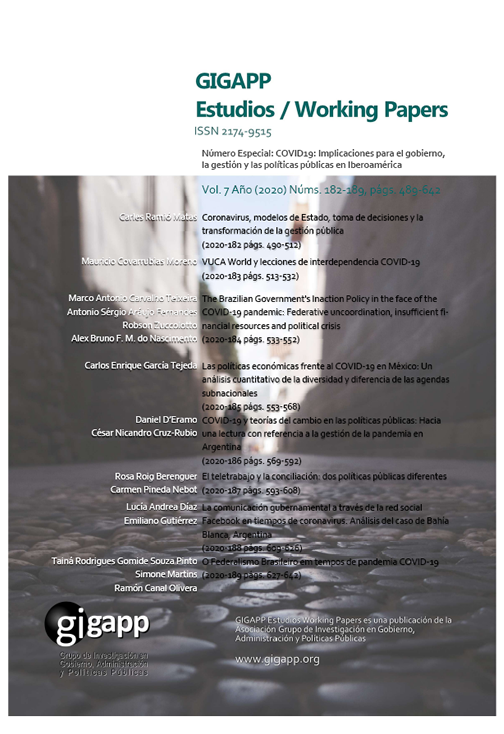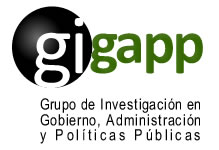VUCA World and interdependence lessons under COVID-19
Abstract
This article deals with interdependence in the denominated “VUCA World”, and takes as an expression of this, the COVID-19 pandemic. This article is structured in four parts. The first, reviews the concept of the world VUCA, an acronym for volatility, uncertainty, complexity, and ambiguity, coined by the intelligence community of the United States Army in the early 1990s, anticipating the emergence of a complex, confusing and diverse global landscape, instead of a simple, clear and monolithic one. The second part explores the unprecedented social interconnection and interdependence, driven by the global advancement and diffusion of information and communication technologies, as well as the dramatic lessons that COVID-19 offers us, in the sense for the record that we are part of the same global network of social, economic, cultural and environmental connections. The third part refers to the need for a comprehensive approach that allows capturing interdependencies and interactions that can only be appreciated from a systemic perspective. The fourth part, formulates some ideas about the need for a governance that has questioned the principle "Think globally, act locally", to propose instead the principle of "Think globally, act globally" as two necessary and complementary principles.
Downloads
References
Aguilar L. F. (2006) Gobernanza y gestión pública, México, Fondo de Cultura Económica.
Andrews S., Whyte J. (2018) Globalization and Public Policy. In: Farazmand A. (eds) Global Encyclopedia of Public Administration, Public Policy, and Governance. Springer, Cham.
Bassets Marc (2020). El virus que bloquea el mundo. Diario El País. 7 de marzo. Disponible: https://elpais.com/sociedad/2020/03/06/actualidad/1583521165442049.html
BBC (2002). World Service, Londres, 2 de septiembre.
Berkley, Seth (2020) COVID-19 needs a big science approach. Science, 27 Mar Vol. 367, Issue 6485, pp. 1407. Disponible en: https://science.sciencemag.org/content/367/6485/1407.full
Brown, Gordon (2020). In the coronavirus crisis, our leaders are failing us. The Guardian. 13 de marzo. Disponible en: https://www.theguardian.com/commentisfree/2020/mar/13/coronavirus-crisis-leaders-failing-gordon-brown-
Bunge, M. (2014, octubre). Big Questions come in bundles, hence they should be tackled systemically. Systema: connecting matter, life, culture and technology, 2(2), 4-13. Disponible en: http://www.systema-journal.org/article/view/346
Caparrós, Martín. (2020). El mundo es plano, The New York Times. 26 de marzo. Disponible en: https://www.nytimes.com/es/2020/03/26/espanol/opinion/coronavirus-cuarentena-martin-caparros.html
Capra, F., y Luisi, P. (2014). The Systems View of Life: A Unifying. Cambridge: Cambridge University Press.
CIFS (2020) Beyond the COVID-19. How the pandemic will shape our future. Copenhagen Institute For Futures Studies, Spring.
CIFS (2020). Pandemics. Existential risks and enablers of change. Copenhagen Institute For Futures Stu-dies.
Covarrubias (2018) Problemas complejos, transversalidad y coordinación en el federalismo, Centro Lati-noamericano de Administración para el Desarrollo.
de Sousa Boaventura (2020). La cruel pedagogía del virus. CLACSO, Buenos Aires.
Dziak Mark. Volatility, uncertainty, complexity and ambiguity (VUCA). Salem Press Encyclopedia, 2019.
Emmert, M, Crow, M y Shangraw, R. (2006). La gestión pública en el futuro: la postortodoxia y el diseño de la organización, en Bozeman (coord.), La gestión pública: su situación actual, Fondo de Cultura Económica, México, pp. 455-474.
Evans, M. (2009). Policy transfer in critical perspective. Policy Studies, 30(3), 243–268.
Ferrari, E., Sparrer, I., y Varga M. (2016). As being is to becoming, so is truth to belief. Simply More Com-plex: A SySt® Approach to VUCA en Mack, O., Khare, A., Kramer, A., Burgartz, Th. (Editores) Man-aging in a VUCA World, Springer.
Friedman, T. L. (2005). The world is flat: A brief history of the twenty-first century. Farrar, Straus and Giroux.
Gleick, James (1987) Chaos: Making a New Science. New York: Penguin Books.
Innerarity, Daniel (2020) Una teoría de la democracia compleja. Gobernar en el siglo XXI. Galaxia Guten-berg, Barcelona: 2020.
Johnson, Jeffrey. (2006). “Can complexity help us better understand risk?”, Risk Management: 1-40.
Lawrence, K. (2013). Developing Leaders in a VUCA Environment, The Power of Experience, UNC Execu-tive Development, UNC Kenan-Flagler Business School.
Mazzucato, M. y Quaggiotto G. (2020), The Big Failure of Small Government, Project Syndicate. May 19. Disponible en: https://www.project-syndicate.org/commentary/small-governments-big-failure-covid19-by-mariana-mazzucato-and-giulio-quaggiotto-2020-05?barrier=accesspaylog
Morçöl, G. (2012). A complexity theory for public policy. London: Routledge.
Mouly, Françoise (2020) Christoph Niemann’s “Critical Mass”. The New Yorker, marzo 23. Disponible en: https://www.newyorker.com/culture/cover-story/2020-03-23
Mulgan, Geoff (1998). Connexity: How to Live in a Connected World, Harvard Business School, Boston.
OECD (2018). Future of Education and Skills 2030: Curriculum Analysis, Paris. Disponible en: https://www.oecd.org/education/2030/Preparing-humanity-for-change-and-artificial-intelligence.pdf
Olson Tom. Navigating Today's VUCA World. Bulletin, junio-julio, 2018. United States Coast Guard Acad-emy Disponible en: http://www.onlinedigeditions.com/article/Navigating+Today%27s+VUCA+World/3111398/504050/article.html
Pichel, Mar (2020). "El coronavirus es un pedagogo cruel porque la única manera que tiene de enseñarnos es matando": entrevista con Boaventura de Sousa Santos. BBC News Mundo, 2 de julio. Disponible en: https://www.bbc.com/mundo/noticias-53219916
Scharmer, Otto (2020). A New Superpower in the Making: Awareness-Based Collective Action. Medium, 8 de abril. Disponible en: https://medium.com/presencing-institute-blog/a-new-superpower-in-the-making-awareness-based-collective-action-83861bcb9859
Skapinker Michael (2018). The empty consolation of ‘Vuca’ and other buzzwords. Financial Times. 22 de octubre. Disponible en: https://www.ft.com/content/9aa465fe-d5e7-11e8-ab8e-6be0dcf18713
Solana, Javier y Daniel Innerarity. (2011). La humanidad amenazada. Madrid: Paidós.
Subirats Joan (2020). Incertidumbre radical. Diario El País, 11 de mayo.
The New York Times (2020). He Warned of Coronavirus. Here’s What He Told Us Before He Died. 7 de febrero. Disponible en:https://www.nytimes.com/2020/02/07/world/asia/Li-Wenliang-china-coronavirus.html
Thorp, Holden (2020). The costs of secrecy, Science, 28 de febrero: Vol. 367, número 6481, págs. 959.
Verna Yu (2020). If China valued free speech, there would be no coronavirus crisis. The Guardian, febrero 8, 2020.
Wagenaar, W.A., Sagaria, S.D. (1975). Misperception of exponential growth. Perception & Psychophysics 18, 416–422.
Wright, Michael (2020) Coronavirus: An Example of What’s Shaping the Exponential Era? Medium, marzo 17. Disponible en: https://medium.com/@wrig0550/coronavirus-an-example-of-whats-shaping-the-exponential-era-1c6602b4564e
Žižek, Slavoj (2020). Pandemia: 25 (Nuevos cuadernos Anagrama) (Spanish Edition) . Editorial Anagrama. Edición de Kindle.
Copyright (c) 2020 Oscar Mauricio Covarrubias Moreno, Dr. (Autor/a)

This work is licensed under a Creative Commons Attribution-NonCommercial-ShareAlike 4.0 International License.
Those authors who have publications with this journal, accept the following terms:
a. Authors will retain their copyrights and guarantee the journal the right of first publication of their work, which will be simultaneously subject to the Creative Commons Attribution-NonCommercial-ShareAlike 4.0 International (CC BY-NC-SA Recognition License). 4.0) that allows third parties to share the work as long as its author and its first publication are indicated in this journal.
Under this open access license, readers (users) can:
- Share — copy and redistribute the material in any medium or format
- Adapt — remix, transform, and build upon the material
Under the following terms:
-
Attribution — Users must give appropriate credit, provide a link to the license, and indicate if changes were made. You may do so in any reasonable manner, but not in any way that suggests the licensor endorses you or your use.
-
NonCommercial — Users may not use the material for commercial purposes.
-
ShareAlike — If remix, transform, or build upon the material, users must distribute your contributions under the same license as the original.
- No additional restrictions — Users may not apply legal terms or technological measures that legally restrict others from doing anything the license permits.
b. Authors may adopt other non-exclusive license agreements for the distribution of the version of the published work (eg: deposit it in an institutional telematic archive or publish it in a monographic volume) provided that the initial publication in this journal is indicated.
c. Authors are allowed and recommended to disseminate their work through the Internet (e.g. in institutional telematic files or on their website) before and during the submission process, which can lead to interesting exchanges and increase citations of the published work. (See The effects of open access).



